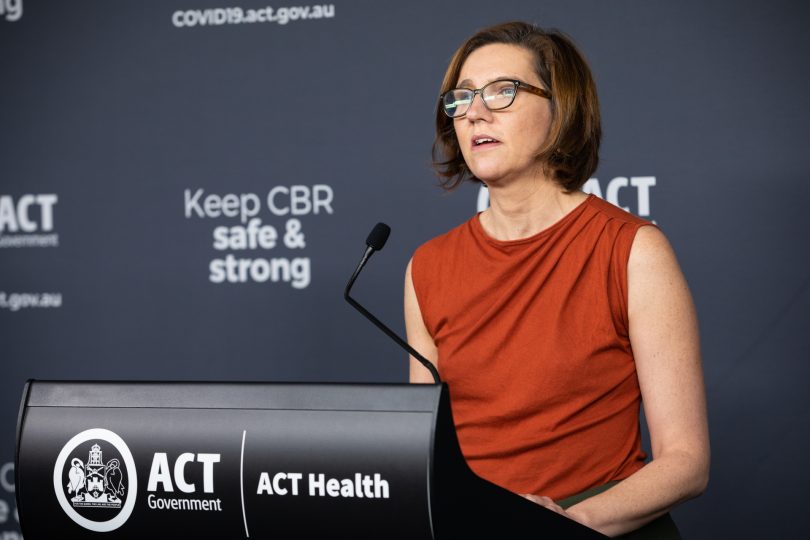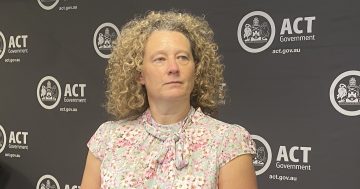
Last Friday, Acting Chief Health Officer Dr Vanessa Johnston defended ACT Health’s approach to releasing information to the public. Photo: Thomas Lucraft.
As accusations about a culture of secrecy at ACT Health abound, the ACT’s Acting Chief Health Officer has defended the directorate’s approach to the release of information.
Dr Vanessa Johnston said ACT Health is bound by privacy concerns that are ostensibly amplified given the small size of the Territory, and that it will not release information that is not in the public interest.
Dr Johnston faced a barrage of questions on Friday (25 March) after emails between health bureaucrats and the Health Minister’s office showed there were concerns about how information about comorbidities and the vaccination status of individuals who died with or were hospitalised with COVID-19 would be interpreted by the public.
But the privacy excuse rings hollow, given the information ACT Health was asked to provide is routinely given in other jurisdictions – including in Tasmania, which is the closest jurisdiction in population size to the ACT, as well as in NSW, a jurisdiction the Territory sits inside geographically.
For comparative purposes, Tasmania’s health authorities provide an updated epidemiological report once a week. The last one was 18 pages long and provided a detailed breakdown of the COVID-19 outbreak since the virus was imported into the state on 15 December 2021.
The Tasmanian Department of Health’s report provided a breakdown of cases by region, local government area and age group. It also provides the vaccination status of individuals hospitalised, admitted to ICU or who die with COVID-19, as well as statistics about how many hospital patients are being treated for COVID-19 symptoms versus how many are in hospital for another reason.

There are currently 46 people in the ACT’s hospitals. Photo: Michelle Kroll.
As of today, there are fewer COVID-19 patients in Tasmania’s hospitals (27) than in the ACT (46).
When the state records a death, where the person died and whether they were vaccinated is usually made publicly available through an announcement. A patient’s underlying health conditions may also be provided.
In the much larger state of NSW, health authorities publish detailed a daily detailed breakdown of new infections on their Twitter account, which includes information about where cases have been reported and the vaccination status and underlying health conditions of people who died with COVID-19.
NSW Health also provides breakdowns of the vaccination status of people hospitalised with COVID-19 in their weekly epidemiological report. The last report was nine pages long.
ACT Health also publishes a weekly epidemiological report. It’s one page long, and despite Acting Chief Health Officer Dr Johnston saying last Friday she thought it provided a breakdown of the vaccination status of individuals hospitalised with COVID-19, it doesn’t.
When questioned last Friday about why other jurisdictions provide so much more detail than ACT Health, Dr Johnston argued health officials are bound by privacy and public health legislation, including the Health Records (Privacy and Access) Act 1997 and that the Territory’s small size makes it more difficult to protect individuals’ privacy.
She rejected a suggestion that it was, in fact, up to the public to determine what is in the public interest and said there was a fine balancing act between the rights of people in hospital – whose data may be released without their consent – and the rights of the public to access information.
“It’s what we have to balance every single day. It’s not just with COVID-19, it’s with all notifiable diseases … particularly when it is important for the public to know about something that’s highly transmissible and could cause severe disease versus the right for that individual to not be identified.
“It’s not to say that you or I might identify that individual, but those that know them – their family, their friends or care providers – might identify them, and that individual hasn’t consented.”
Asked why the ACT could not release a breakdown of cases by area or suburbs like NSW and Tasmania both do, Dr Johnston again cited “privacy” reasons.
“[Doing this is] not particularly useful, it’s not in the public interest because COVID-19 is everywhere, it’s everywhere and … [because] we can get numbers down to less than five in certain suburbs, we are really hesitant to release small numbers whether it be by geographic region or by vaccination status or whatever if it’s not in the public interest,” she explained.
But somehow, in last year’s Delta outbreak, it had been “in the public interest” because “there was real evidence that people needed that information to make the choice to get vaccinated”.





















